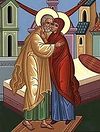

| Previous day | Next day |
| Old Style
July 25
|
Wednesday |
New Style
August 7
|
|
7th Week after Pentecost.
Tone 5.
Fast Day. |
Wine and oil allowed.
|
![]() The Dormition of the Righteous Anna, Mother of the Most Holy Theotokos.
The Dormition of the Righteous Anna, Mother of the Most Holy Theotokos. ![]() Sts. Olympias (Olympiada) the Deaconess, of Constantinople (409),
Sts. Olympias (Olympiada) the Deaconess, of Constantinople (409), ![]() and the Virgin Eupraxia of Tabennisi (413).
and the Virgin Eupraxia of Tabennisi (413). ![]() St. Macarius of Zheltovod and Unzha, monastic founder (1444).
St. Macarius of Zheltovod and Unzha, monastic founder (1444).
Commemoration of the Holy 165 Fathers of the Fifth Ecumenical Council (553). St. Christopher, abbot of Solvychegodsk (Vologda) (1572).
New Hieromartyr Alexander Sakharov, archpriest, of St. Petersburg (1927). New Hieromartyr Theodore Tonkovid, priest, of Lovets (Pskov) (1942).
St. Gregory (Kallidis), metropolitan of Thessalonica and Heraclea (1925). New Hieromartyrs Vukosav Milanovic and Rodoljub Samardzic, of Kulen Vakuf, Serbia (1941-1945).
Thoughts for Each Day of the Year
According to the Daily Church Readings from the Word of God
By St. Theophan the Recluse

Wednesday. [I Cor 7:12-24; Matt. 14:35-15:11]
Not that which goeth into the mouth defileth a man; but that which cometh out of the mouth, this defileth a man. The Lord said this not because He did not favour fasting, or because He considered it not necessary for us—no, both He Himself fasted, and taught the apostles to do so, and He established fasts in his holy Church; but He said this so that we would not only fast by eating little or only uncooked food, but rather so that we would keep the fast in our soul, not indulging it with desires and passionate inclinations. And this is the important thing. Fasting serves as a powerful means for this. The foundation of the passions in the flesh; when the flesh is emaciated, then it is as if a hole is dug under the passions and their fortress is destroyed. Without fasting, overcoming the passions would be a miracle, similar to being in a fire and not being burned. How can he who profusely satisfies his flesh with food, sleep and rest, keep anything spiritual in mind and in his intentions? For him it is as easy to renounce the earth, to contemplate and strive for the invisible world, as would be for an old, decrepit bird to take flight and soar.
Articles
 Holy, Righteous Ancestor of God, AnnaSaint Anna was the daughter of Matthan the priest, who was of the tribe of Levi. St Anna’s family came from Bethlehem. |
 Virginmartyr Eupraxia of TabennaSaint Eupraxia was daughter of the Constantinople dignitary Antigonos, a kinsman of the holy Emperor Theodosius the Great (379-395). |
 Venerable Macarius the Abbot of Zheltovod and UnzhaAt twelve years of age he secretly left his parents and accepted monastic tonsure at the Nizhni-Novgorod Caves monastery under Saint Dionysius. |






